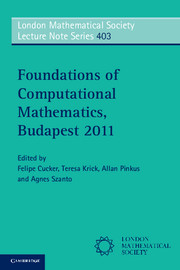Book contents
- Frontmatter
- Contents
- Preface
- Contributors
- 1 The State of the Art in Smale's 7th Problem
- 2 The Shape of Data
- 3 Upwinding in Finite Element Systems of Differential Forms
- 4 On the Complexity of Computing Quadrature Formulas for SDEs
- 5 The Quantum Walk of F. Riesz
- 6 Modulated Fourier Expansions for Continuous and Discrete Oscillatory Systems
- 7 The Dual Role of Convection in 3D Navier-Stokes Equations
- 8 Algebraic and Differential Invariants
- 9 Through the Kaleidoscope: Symmetries, Groups and Chebyshev-Approximations from a Computational Point of View
- 10 Sage: Creating a Viable Free Open Source Alternative to Magma, Maple, Mathematica, and MATLAB
- References
9 - Through the Kaleidoscope: Symmetries, Groups and Chebyshev-Approximations from a Computational Point of View
Published online by Cambridge University Press: 05 December 2012
- Frontmatter
- Contents
- Preface
- Contributors
- 1 The State of the Art in Smale's 7th Problem
- 2 The Shape of Data
- 3 Upwinding in Finite Element Systems of Differential Forms
- 4 On the Complexity of Computing Quadrature Formulas for SDEs
- 5 The Quantum Walk of F. Riesz
- 6 Modulated Fourier Expansions for Continuous and Discrete Oscillatory Systems
- 7 The Dual Role of Convection in 3D Navier-Stokes Equations
- 8 Algebraic and Differential Invariants
- 9 Through the Kaleidoscope: Symmetries, Groups and Chebyshev-Approximations from a Computational Point of View
- 10 Sage: Creating a Viable Free Open Source Alternative to Magma, Maple, Mathematica, and MATLAB
- References
Summary
Abstract
In this paper we survey parts of group theory, with emphasis on structures that are important in design and analysis of numerical algorithms and in software design. In particular, we provide an extensive introduction to Fourier analysis on locally compact abelian groups, and point towards applications of this theory in computational mathematics. Fourier analysis on non-commutative groups, with applications, is discussed more briefly. In the final part of the paper we provide an introduction to multivariate Chebyshev polynomials. These are constructed by a kaleidoscope of mirrors acting upon an abelian group, and have recently been applied in numerical Clenshaw-Curtis type numerical quadrature and in spectral element solution of partial differential equations, based on triangular and simplicial subdivisions of the domain.
Introduction
Group theory is the mathematical language of symmetry. As a mature branch of mathematics, with roots going almost two centuries back, it has evolved into a highly technical discipline. Many texts on group theory and representation theory are not readily accessible to applied mathematicians and computational scientists, and the relevance of group theoretical techniques in computational mathematics is not widely recognized.
Nevertheless, it is our conviction that knowledge of central parts of group theory and harmonic analysis on groups is invaluable also for computational scientists, both as a language to unify, analyze and generalize computational algorithms and also as an organizing principle of mathematical software construction.
- Type
- Chapter
- Information
- Foundations of Computational Mathematics, Budapest 2011 , pp. 188 - 229Publisher: Cambridge University PressPrint publication year: 2012
References
- 5
- Cited by

